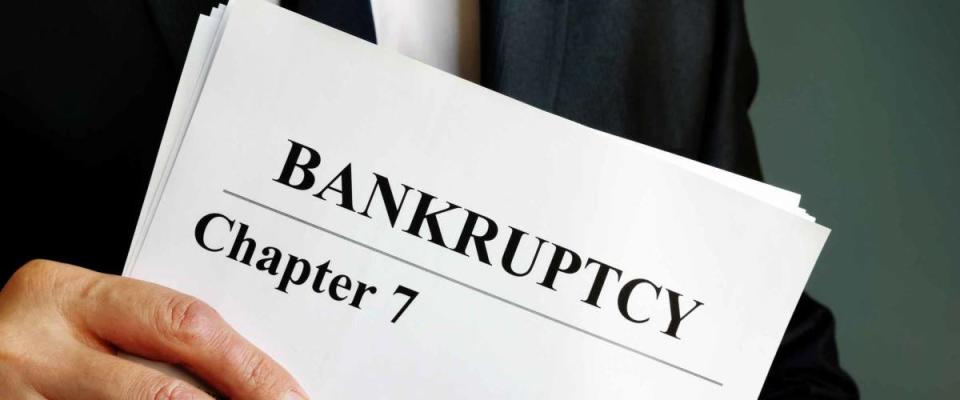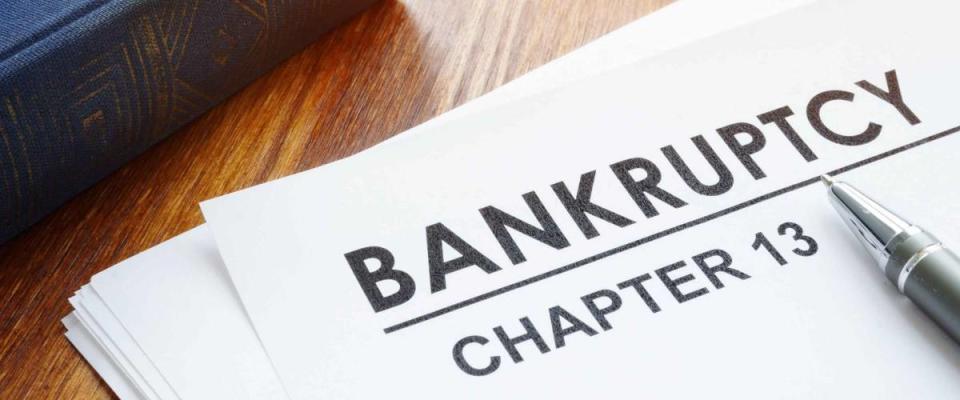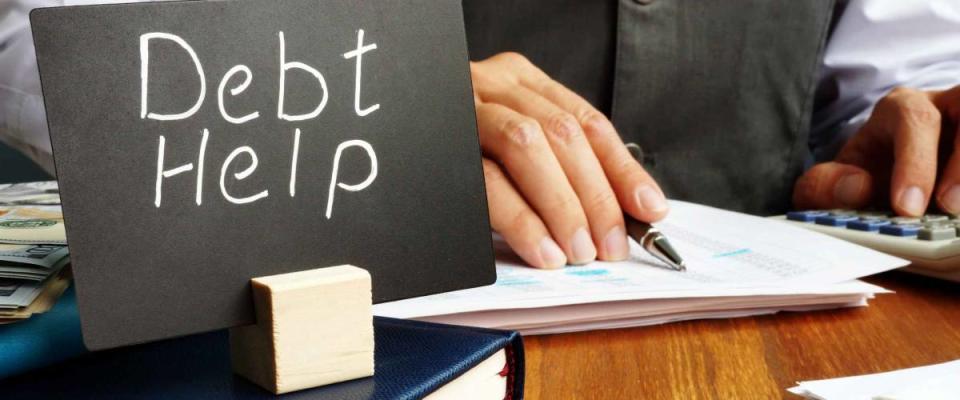Bankruptcies are expected to surge — but a filing isn't fatal to your credit

With several forms of federal aid ending and Congress unlikely to beef up unemployment benefits or send out a second round of stimulus checks, experts are predicting personal bankruptcies will surge before the end of 2020.
"All of us in the field are expecting bankruptcies to spike up dramatically, probably later this year and even more so into the New Year as the longer-lasting effects of the pandemic hit people in the wallet," Ike Shulman, co-founder of the National Association of Consumer Bankruptcy Attorneys, tells Forbes.
One of the biggest concerns is the far-reaching effects of tarnished credit reports and scores left in the wake of filing for bankruptcy. Folks struggling already will have a hard time borrowing when they need it the most.
How long a bankruptcy tarnishes your credit depends on which type you filed. There are two kinds for individuals: Chapter 7 and Chapter 13.
Although a bankruptcy filing remains on your credit report for up to a decade, the situation is not quite as bad as it seems. The effect on your credit will diminish over time until it drops off your report completely.
How long does Chapter 7 bankruptcy stay on your credit report?

Chapter 7 bankruptcy is the classic bankruptcy measure for people who have defaulted — that is, failed to pay their loans. This form of bankruptcy clears most debts, including:
Credit card debt Medical bills Personal loans
Chapter 7 bankruptcy stains your credit report for 10 years from the date of filing. The bankruptcy can also cause your credit score to plummet by 200 points or more.
Any debts that were wiped away by filing for Chapter 7 bankruptcy will be included on your credit report.
To qualify for Chapter 7 bankruptcy, you must first pass a “means test” that assesses your income and assets-to-debt ratio. Oftentimes your property, cars and other valuables might have to be sold off in order to pay back as much of the debt as possible — but some day-to-day essentials you own might be exempt under the law, such as your home or computers you use for work.
How long does Chapter 13 bankruptcy stay on your credit report?

Chapter 13 bankruptcy, also known as “wage earner’s bankruptcy,” is for people who earn too much money to qualify for Chapter 7 but not enough to actually satisfy their creditors' demands.
As with Chapter 7 bankruptcy, filing for Chapter 13 bankruptcy will torpedo your credit score, but the filing will only remain on your credit report for seven years.
If you need to apply for another loan during that time, you’ll need to file a motion and obtain the court’s permission first.
Under Chapter 13 bankruptcy, the court creates a payment plan for you to repay as much of your debt as possible over the span of three to five years.
After that span of time, any remaining debts are wiped clean, meaning that your creditors may not get the full amount you owe them. Chapter 13 bankruptcy allows you to repay some of your debt while still holding on to your assets, including cars, jewelry and property.
Can you get a bankruptcy off your report faster?
You can only have a bankruptcy removed from your credit report early if you find some error or inconsistency in the way it’s been recorded.
Get a free credit score and credit report and look closely for mistakes. If you find any errors with your personal information, debts, creditors, timelines or other information, file a dispute with the credit bureau. If the credit bureau is unable to access the right information to correct the mistake, it may remove the entry entirely.
If you don't find anything, bad news: You're stuck with the bankruptcy on your credit report. The good news? Bankruptcies automatically fall off your credit report after the designated amount of time. If one doesn’t, you should immediately file a dispute with the credit bureaus.
Meanwhile, while you’re patiently waiting for those bankruptcies to drop off your credit report, you can begin devising ways to improve your score.
Tips for life during and after bankruptcy

While bankruptcy is certainly a financial setback, and you might feel like you’ll never recover, plenty of people make it through OK. More than three-quarters of a million Americans filed in 2019 alone.
Your focus simply needs to be on rebuilding your credit for the future. And you can begin to rebuild even before the bankruptcies fall off your report.
Budget, budget, budget
Sometimes life catches you off guard. Often, people are forced to declare bankruptcy for unforeseen emergencies, like medical bills or job loss. If you’re among the majority of Americans who say they don’t have an emergency fund, it’s time to create one.
Crunch the numbers on your spending habits so you can save enough money to cover expenses for three months at a minimum. Then consider stashing your emergency savings in a high-yield savings account to help your money grow while you aren’t using it.
To avoid racking up more debt, ensure you’re only running up a balance on your credit card that you can pay off in full each month.
Double-check your credit report
Mistakes on your report, like a “missed payment” you actually made on time, can ding your credit score even more.
After getting your free credit report and credit score from at least one of the big bureaus, look for any inaccurate personal information, such as your name, address and date of birth.
Then review all the accounts listed on your credit report. Look for accounts that don’t belong to you, on-time payments that are listed as late payments and whether the account status is open, closed or “charged off.”
You can dispute errors on your credit report in writing or online. You will need to tell each bureau what information you think is inaccurate; you can use this sample letter from the Federal Trade Commission to draft your own.
Add new credit
The best way to rebuild your credit after bankruptcy is to prove that you’ve learned to be a responsible borrower.
A secured credit card can help you raise your credit score by establishing a positive record of borrowing. The card requires a deposit, which becomes the credit limit on the card and serves as collateral in case you can’t make your monthly payment.
You can also become an authorized user on a family member’s credit card, even without getting a physical card yourself. If they have a well-managed card, the account is added to your credit report — meaning all those on-time payments they make are building credit for you, too.
There are also credit building loans, where the purpose is solely to increase your credit score. The loan is held safely in a bank account while you make payments, and you can only access the money when you’re done.
Is bankruptcy worth it?

Federal student loans, taxes, criminal fines, alimony or child support can’t be discharged in bankruptcy. There are some consequences you can't escape.
But if you’re struggling to repay your debts, Chapter 7 bankruptcy can eliminate most of your unsecured debt in a matter of months. If you qualify for Chapter 13 bankruptcy, it may be wise to consult with a debt relief agency to figure out whether that’s the better road to take.
There’s no shame in admitting you’re in over your head. But because of the damage to your credit score, bankruptcy should be a last-ditch resort for people whose debts have run wild and peaked over 50% of their annual income.
Before filing, be sure to look at alternative debt relief strategies, such as:
Debt settlement: You can hire a third-party company to negotiate with your creditors to see if they’ll settle your debt. You repay an amount you can afford so they let you off the hook for the rest. But while debt settlement could help you avoid bankruptcy, it can still be costly and even negatively impact your credit score if your accounts are considered delinquent.
Debt consolidation: By replacing your old loans with a single new one at a much lower interest rate, debt consolidation might give you the opportunity to ease your debt burden and actually boost your credit score. You can also try moving your debts over to a balance transfer credit card — a card that offers a 0% APR for a period of time — so you can focus on paying off the debt before it spirals out of control.
Debt repayment strategies: Consider whether you might benefit from using a debt snowball or debt avalanche repayment strategy to keep yourself on track to debt freedom, before bankruptcy becomes your only hope.
These options will be far more simple and won’t harm your credit score long term — preventing you from doing things like buying a home when you’re finally back to being financially stable.

